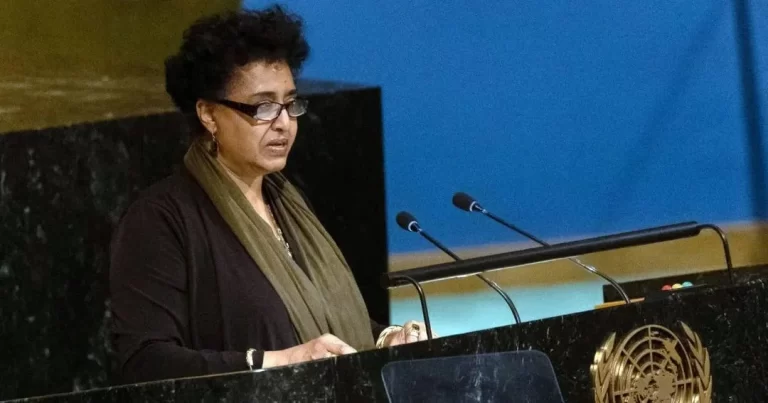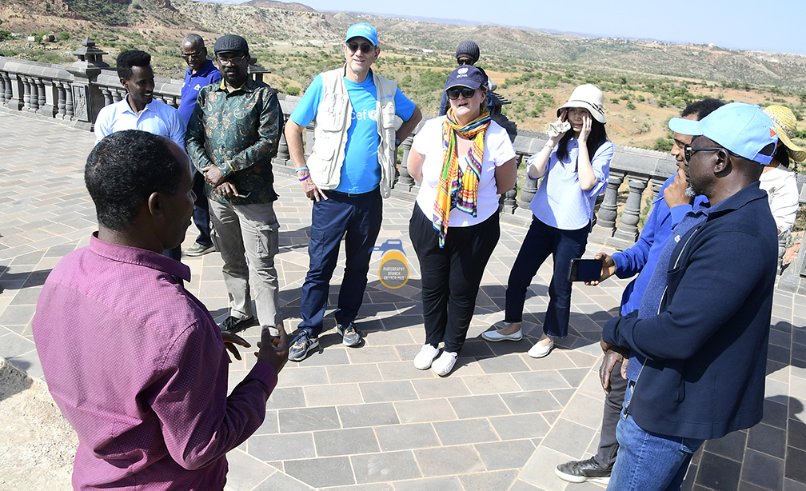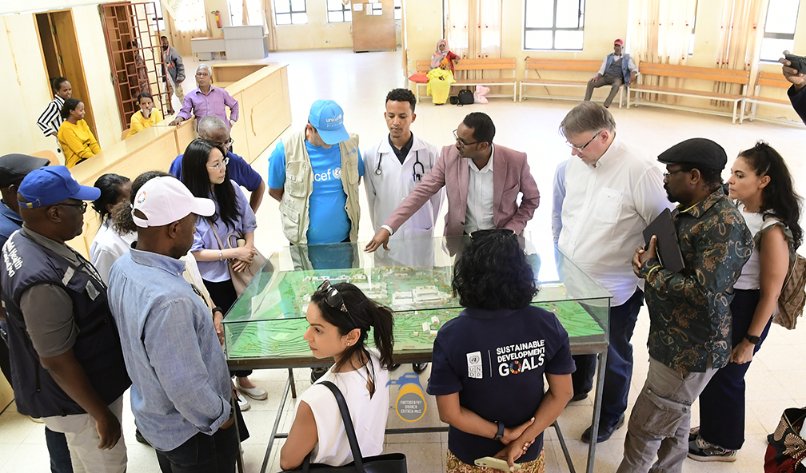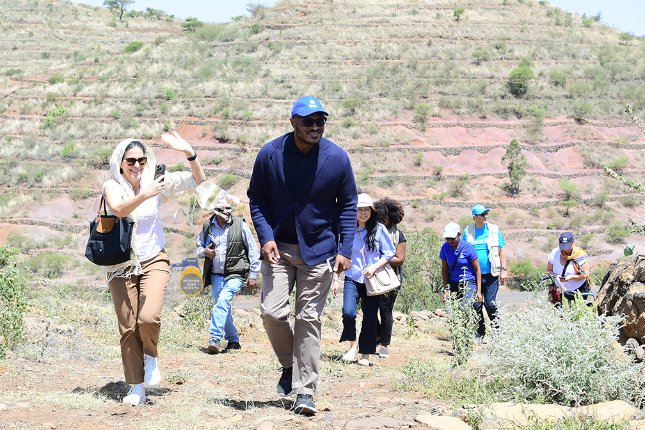 A Mandate Built on Politics, Not Principle: Time for the Human Rights Council to Reassess Eritrea
By H.E. Sophia Tesfamariam
https://www.america-times.com/a-mandate ... s-eritrea/
June 13, 2025
A Mandate Built on Politics, Not Principle: Time for the Human Rights Council to Reassess Eritrea
By H.E. Sophia Tesfamariam
https://www.america-times.com/a-mandate ... s-eritrea/
June 13, 2025


The 2025 Report of the UN Special Rapporteur on the Situation of Human Rights in Eritrea (A/HRC/59/24) represents the latest manifestation of a deeply flawed and politically motivated mandate that has been in place since 2012. From its inception, this mandate has lacked the support of almost all African states, and has been kept alive solely by a narrow group of Western sponsors.
This article provides a comprehensive rebuttal grounded in international law, Eritrea’s national legal framework, and a call for reform within the Human Rights Council to uphold genuine multilateralism. Eritrea’s opposition is not a rejection of human rights but a principled stand against selective, politicized mechanisms that violate sovereignty and undermine cooperation.
The mandate of the Special Rapporteur was politically engineered in 2012 by the United States and its European Allies at a difficult juncture in Eritrea’s relationships with these powers essentially because they wanted to alter the “
final and binding” EEBC Award to mollify Ethiopia within their perceived geopolitical interests and as the UNSC sanctions regime that they had earlier imposed on Eritrea was facing growing opposition from several member States. To imbue an African mantle to this machination, the Resolution was sponsored by Nigeria, which did not even have diplomatic presence in Eritrea; Djibouti, which was embroiled in a putative border dispute with Eritrea; and Somalia which was arm-twisted to do so under threat of severance of substantial financial and military assistance that it was receiving from them at that time.
Importantly, none of these countries, nor any other African states, have supported the subsequent annual resolutions that have sustained the mandate. This absence of sustained regional support underscores that the mandate does not reflect regional consensus or a genuine concern for Eritrean human rights, but rather a geopolitical tool wielded by a coalition of Western states to isolate Eritrea. Such a narrow sponsorship violates the principles of inclusivity, impartiality, and universality that are fundamental to the UN human rights system.
The very existence of a country-specific mandate on Eritrea establishes a dangerous precedent within the Human Rights Council’s special procedures. Unlike most mandates, which apply universally or regionally, this one singularly targets Eritrea. This selective scrutiny contradicts the Council’s foundational norms of impartiality and non-selectivity. Eritrea’s experience reveals how the mandate’s origin and continuation serve political objectives rather than humanitarian imperatives. This double standard not only undermines the Council’s credibility but alienates developing states, diminishing their trust in international human rights mechanisms.
Moreover, the imposition of the mandate without Eritrea’s consent infringes on the UN Charter’s respect for state sovereignty and non-intervention. Effective human rights cooperation must be founded on dialogue, partnership, and respect, not coercion or punitive mandates imposed unilaterally. Eritrea has consistently expressed willingness to cooperate with UN bodies on these bases, as demonstrated through engagement with several UN agencies including UNDP, UNICEF, WHO, and others. It has also served diligently in the UN Human Rights Council for two terms, despite the overwhelming workload.
The mandate’s continuation wastes substantial UN resources that could be better used to address pressing humanitarian needs, development, and peacebuilding throughout the region. This persistent politicization fosters an atmosphere of harassment and stigmatization that harms Eritrea’s people more than it promotes their rights. The Human Rights Council should heed calls from Eritrea and many member states to discontinue this divisive unwarranted mandate and adopt more inclusive, transparent, and constructive approaches to human rights promotion worldwide.

Eritrea is under no legal obligation to cooperate with mechanisms it deems illegitimate or selectively applied. The principle of non-intervention in domestic jurisdiction is a cornerstone of international law. No UN human rights mechanism can override a state’s sovereign consent. Eritrea has consistently emphasized this in official statements and diplomatic forums, asserting its sovereign prerogative and the need for genuine partnership.
The National Service Program (NSP), a frequent target of criticism in the Special Rapporteur’s reports, is legally established under
Proclamation No. 82/1995. It is a comprehensive system that combines military training with civic and developmental service, designed to promote national unity, self-reliance, and post-war reconstruction.
Internationally, the NSP is well within legal bounds.
Article 2(2) of the
International Labour Organization’s Forced Labour Convention (No. 29) explicitly excludes both compulsory military service and civic duties from the definition of forced labor. Thus, characterizing the NSP as “
indefinite slavery” is a legally untenable distortion. It ignores the statutory 18-month service duration during peacetime, misrepresents international legal norms, and disregards Eritrea’s sovereign right, like all nations, to institute national service in pursuit of collective development and national security.
Crucially, the NSP extends far beyond military conscription. It is a structured platform that incorporates vocational, technical, and academic pathways. Through it, thousands of Eritrean youth contribute to agricultural development, infrastructure, education, and public health, sectors vital to Eritrea’s socio-economic progress. In many rural and underserved areas, national service members are the principal providers of essential services.
The international narrative around the NSP often hinges on unverifiable testimonies and politically charged rhetoric, while systematically ignoring the experiences of the majority who see national service as a duty, a learning opportunity, and a meaningful contribution to their country’s growth.
Moreover, labeling the NSP as “
slavery” is both factually incorrect and morally irresponsible. The term “
slavery” carries specific historical and legal connotations. To misuse it in the Eritrean context is to trivialize the horrors of the transatlantic slave trade and ongoing forced labor practices elsewhere, many of which are neglected by the same actors who claim to champion human rights.
Eritrean youth in national service, are not slaves. They are builders, educators, healthcare workers, engineers, and defenders of national sovereignty. Their service is not just to the state, but to their communities and to future generations. To call them slaves is not only false; it is a grave insult to their dignity and to the national effort to rebuild a country still emerging from the shadows of war.
Eritrea’s Civil, Penal and Commercial Codes, which underwent thorough review in 2015, guarantee the civil and political rights of all its citizens. However, Eritrea emphasizes that these rights must be exercised responsibly within the country’s multi-ethnic, security-sensitive environment.
The postponement of national elections and the envisaged full implementation of the Constitution remains postponed due to relentless external adversity.
Eritrea’s media regulations balance freedom of information with national security and social responsibility, aiming to prevent misinformation, hate speech, and destabilizing propaganda. While international critiques highlight restrictions, Eritrea asserts that media freedom cannot come at the cost of national unity or order. Judicial guarantees such as fair trial rights, equality before the law, and protection against arbitrary arrest are enshrined in Eritrean law. Ongoing reforms are aimed at strengthening judicial independence, improve access to justice, and expand legal aid and community-based dispute resolution. Additionally, traditional governance structures complement formal institutions, fostering social cohesion through culturally relevant dispute mechanisms.
Eritrea’s approach balances individual freedoms with collective security, sovereignty, and development goals. The country remains open to constructive international cooperation, respecting its sovereignty and contextualizing human rights within national priorities. Unfortunately, external reports often overlook these nuances, favoring selective narratives that ignore Eritrea’s legal frameworks and security realities.
Religious freedom in Eritrea is likewise frequently misrepresented by the Special Rapporteur mandate, which often relies on unverified sources and politically motivated accounts. There are four historically and officially recognized religious institutions: the Eritrean Orthodox Tewahedo Church, Roman Catholic Church, Evangelical Lutheran Church, and Sunni Islam. The Government issued Proclamation to regulate Church – State ties within a secular setting and to eschew external funding for religious institutions. Registration requirements align with international standards and reflect Eritrea’s sovereign right to regulate religious activity in the interest of public order.
Eritrea boasts a long history of religious coexistence, with Muslims and Christians living side by side in mutual respect and national unity. Interfaith dialogue, joint community projects, and government engagement with religious leaders demonstrate the country’s commitment to religious harmony. Allegations of religious persecution often emanate from politically motivated sectarian groups and lack independent verification. Many reported “
victims”, have engaged in unauthorized religious activities or politicized religious identity for external influence. Eritrea addresses such cases through legal means, prioritizing rehabilitation and dialogue over punitive action. The government welcomes constructive engagement with international religious freedom bodies to enhance mutual understanding, within the framework of sovereignty and security.
Procedurally, the Special Rapporteur’s methodology suffers from fundamental flaws. Heavy reliance on anonymous testimonies, refusal to consider Eritrean national submissions, and absence of in-country engagement violate the Code of Conduct for Special Procedures Mandate-Holders (
HRC Resolution 5/2). Eritrea’s openness to genuine UN cooperation contrasts starkly with the mandate’s one-sided demands and disregard for Eritrea’s contributions to the UN.
The use of human rights mechanisms as instruments of geopolitical pressure, severely undermines the credibility of the UN human rights system. Eritrea joins other states in calling attention to the selective application of human rights norms, where states with colonial legacies and contemporary abuses evade scrutiny, while independent states face punitive exceptionalism. This double standard weakens multilateral institutions and alienates developing countries, impeding global governance reform. Addressing these structural imbalances is essential to restore trust and effectiveness in the Human Rights Council.
The continued allocation of UN resources to this politicized mandate against Eritrea is not only legally untenable, but morally questionable. These funds should be redirected to urgent humanitarian crises, peacebuilding, and technical cooperation with willing partners. Eritrea prioritizes grassroots development, social cohesion, and resilience, and urges the Human Rights Council to replace politically motivated mechanisms with cooperative frameworks grounded in universality, impartiality, and non-selectivity.
In conclusion, the 2025 Special Rapporteur Report on Eritrea fails to meet international standards of impartiality, evidence, and legal foundation. The mandate’s origins, methods, and persistence exemplify systemic imbalance in the UN human rights system. The mandate no longer meets the threshold of legitimacy or utility and must be terminated under Rule 117 of the Council’s rules of procedure, which provides for the discontinuation of mandates that have exhausted their purpose or lack justification.
Eritrea will continue to engage constructively with the international community through legitimate multilateral frameworks based on mutual respect, sovereign equality, and genuine dialogue. However, it will not recognize or legitimize politically driven mechanisms rooted in hostility and double standards and calls on the Human Rights Council to discontinue this discredited mandate and pursue a more balanced, inclusive, and cooperative approach to human rights worldwide.








